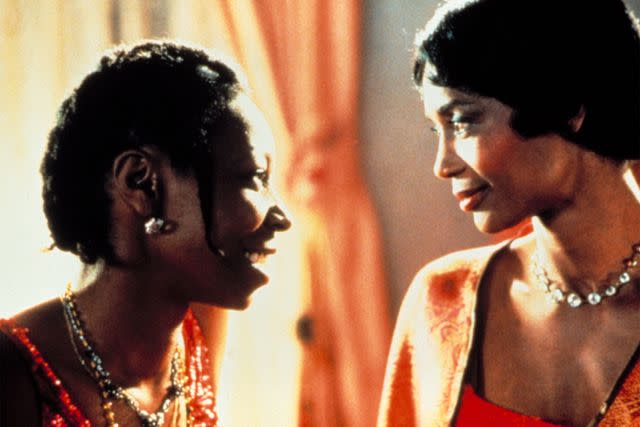Aunjanue Ellis-Taylor criticizes “The Color Purple” for queer erasure: 'You're sanitizing me and my friends. Why?'
“I want people to walk away from 'The Color Purple' thinking, 'I just saw a movie about Black lesbians.' I don't think that has happened.”
Aunjanue Ellis-Taylor isn’t just aware of the criticism surrounding The Color Purple’s central queer romance, she agrees with it.
After appearing in the 2023 film as mother to its protagonist, the actress didn’t hesitate to voice her frustration with the adaptation — or her love for the Alice Walker novel that it’s based on — during a recent interview.
"The Color Purple is a book about Black lesbians. Whether the choice was made to focus on that or not in the cinematic iterations of The Color Purple, it's still a movie about Black lesbians,” Ellis-Taylor told Buzzfeed when asked about the conversation surrounding queer erasure in the adaptation. “People can try to say the story is about sisterhood, but it's a story about Black lesbians. Period.”
She continued, “What is hard for me is that when we have those spaces where we can honor the truth of that, we walk away from it. We suppress it. We hide it. We sanitize it. In the sanitizing of it, someone like me — knowing that The Color Purple is a book about Black lesbians — looks at that and thinks, ‘You're sanitizing me and my friends, and other people who I love and adore. Why?’”

Mat Hayward/Getty Images; Everett Collection
Aunjanue Ellis-Taylor, and Taraji P. Henson and Fantasia Barrino in 'The Color Purple'Walker's 1982 novel tells the story of Celie, a woman on a decades long journey of self-realization as she survives racism, domestic abuse, and misogynoir. Central to that journey is her relationship with another woman, Shug Avery — yet both Steven Spielberg’s 1985 film and Blitz Bazawule’s 2023 musical adaptation, have been criticized for downplaying the pivotal romance.
The novel details Celie’s attraction to Shug from the moment she catches sight of her in a bath to the intimate interactions that follow as they begin a years-long relationship. In contrast, the Spielberg film features a tender moment between the duo that ends in a kiss before cutting away.
“The first time that I saw The Color Purple, it [was] before I understood who I was,” Elli-Taylor said. “I knew that watching Margaret Avery kiss Whoopi Goldberg was astonishing, exciting, and affirming. It showed me the possibility of myself and the possibility to love a woman who loves me in return. I'll never get over that. It lives with me.”
While the latest film, featuring Fantasia Barrino as Celie and Taraji P. Henson as Shug, offers a more explicit look at the relationship — including the bathtub scene, a kiss, and a romantic duet — it doesn’t match the detailed exploration featured in Walker’s novel.

Everett Collection
Whoopi Goldberg and Margaret Avery in 'The Color Purple (1985)'“Alice Walker wrote The Color Purple with intention because she was writing about herself,” Ellis-Taylor said. “I just want that part of the book to be portrayed in the films with intention, instead of it being incidental. I want people to walk away from The Color Purple thinking, ‘I just saw a movie about Black lesbians.’ I don't think that has happened.”
Emphasizing the longevity of the Pulitzer-Prize winning novel, she continued, “Somebody has to be brave. Alice Walker wrote a book about Black lesbians, and we're still telling that story today. The Color Purple is one of the most important books in the canon of world literature. Also, you have to have Black women and Black queer women in the making of it... The first one was written and directed by a white man. The remake was written and directed by a Black man. I think the writer might be a queer man, but it ain't the same.”
For her part, Walker has expressed some satisfaction with the relationship's portrayal in the latest film. “I really love it that [audiences] have to take away the reality that Shug and Celie become lovers, because I think that we have really needed help there,” she told The Hollywood Reporter following the film's release. “We really needed to see that love is love. You know, that people love whoever they love, and it is their right to do that.”
Want more movie news? Sign up for Entertainment Weekly's free newsletter to get the latest trailers, celebrity interviews, film reviews, and more.
Related content:
Read the original article on Entertainment Weekly.


